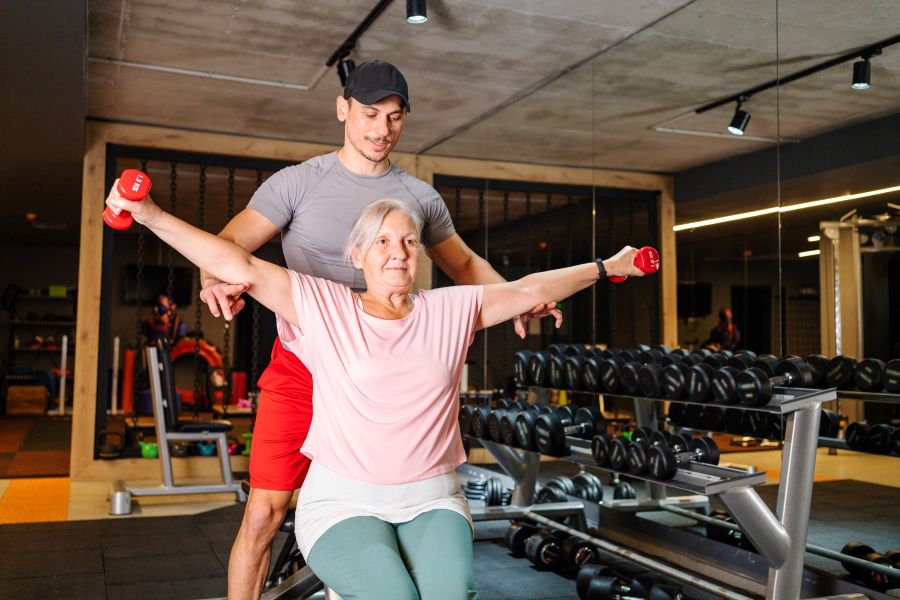
Orthopedic surgeon Dr. Alexis Alva specializes in hip and knee replacement surgeries, including revision procedures. While her practice focuses on joint replacement, she sees firsthand how osteoporosis complicates recovery.
“Hip and knee replacements are very common procedures that are done, and if you have osteoporosis, it makes the risk factors during that surgery a little higher,” she explained.
More importantly, osteoporosis itself can lead to fractures that require surgical intervention.
“Sometimes osteoporosis can be so bad that a patient can actually break their bone from a relatively low trauma, and then they ultimately need a hip or knee replacement because of the breaks that this osteoporosis causes,” Dr. Alva said.
What osteoporosis is
Osteoporosis is defined by “low bone mass, microarchitectural disruption of the bone and increased skeletal fragility, which overall just results in decreased bone strength and the increased risk of fracture.” In other words, weakened bones make patients more susceptible to breaks.
Bone density peaks in the early 30s, then gradually declines. For women, the steepest drop occurs around menopause, while men experience a slower decline from a higher baseline. By age 50, “20% of women and 4% of men … have osteoporosis,” Dr. Alva noted. By age 85, 70% of women and 30% of men are affected.
Risk factors
Several factors influence who develops osteoporosis:
- Advanced age: As we age, our bone quality goes down.
- Steroid use: Long-term steroid therapy, even in the past, raises risk.
- Low body weight: Less than 127 pounds is a concern.
- Parental history of hip fracture: If mom or dad unfortunately had a hip fracture, that’s usually a sign that there’s something in your genetics that predisposes you to it.
- Cigarette smoking and excess alcohol use: Pretty much all the vices that we talk about in medicine cause osteoporosis.
- Rheumatoid arthritis also increases risk.
Many of these are modifiable.
“You can stop smoking. You can decrease your alcohol intake. You can have a healthy diet to increase your body weight,” Dr. Alva emphasized.
Why fractures matter
Fragility fractures — caused by simple falls from standing height — should not occur in people with normal bone strength.
“If myself fell right now on a ground-level fall, I wouldn’t break my hip. But if I were 85 and had osteoporosis, that very much likely could,” Dr. Alva said.
The most common sites are the hip, spine and wrist. While spine and wrist fractures may be managed without surgery, hip fractures almost always require an operation.
“If you want to get up and walk again, you have to have a surgery to fix it,” she noted.
Screening for osteoporosis
The best way to know your risk is through a bone density scan, commonly a DEXA scan.
“This should be done in all women older than 65,” Dr. Alva said.
Screening earlier is appropriate for postmenopausal women with multiple risk factors, as well as older men with signs of bone weakness or fractures.
Prevention and lifestyle changes
Dr. Alva highlighted several steps anyone can take:
- Quit smoking: “You just get so many health benefits from quitting smoking, not only from a bone standpoint, from a cardiovascular standpoint.”
- Limit alcohol: “It doesn’t have to be complete cessation, but … you’ll want to just limit your alcohol intake.”
- Exercise regularly: At least 30 minutes of weight-bearing and muscle-strengthening activity most days. “The forces of the muscles on the bone help increase it … and it also helps improve just your overall balance and mobility and preventing falls.”
- Nutrition: Aim for 1,200 mg of calcium and 600–1,000 IU of vitamin D daily, preferably from food, but supplements work if needed.
Medical treatments
While Dr. Alva does not prescribe osteoporosis medications, she stressed their importance.
“The initial treatment is typically a bisphosphonate … they work by preventing the resorption of bone.”
Newer therapies, including estrogen replacement and anabolic agents, may also help patients rebuild bone density.
Ultimately, Dr. Alva encourages patients to know their risks and take action.
“You don’t just have to accept where you are now. We can make changes to improve.”
Learn more from Northside Hospital Orthopedics.
Northside offers online scheduling for bone density scans. Schedule your appointment today.

